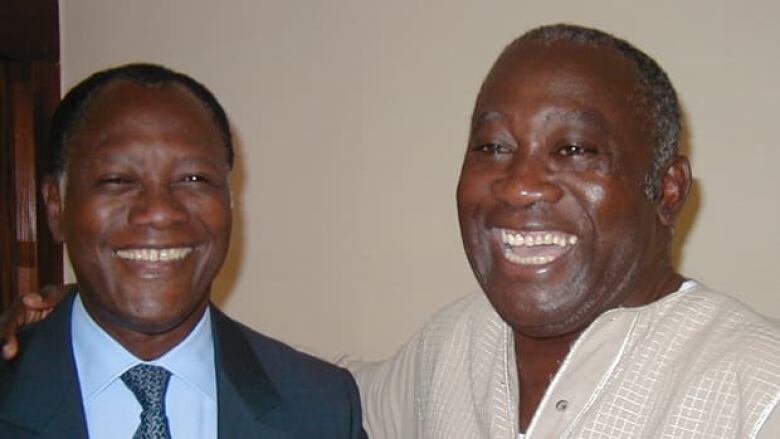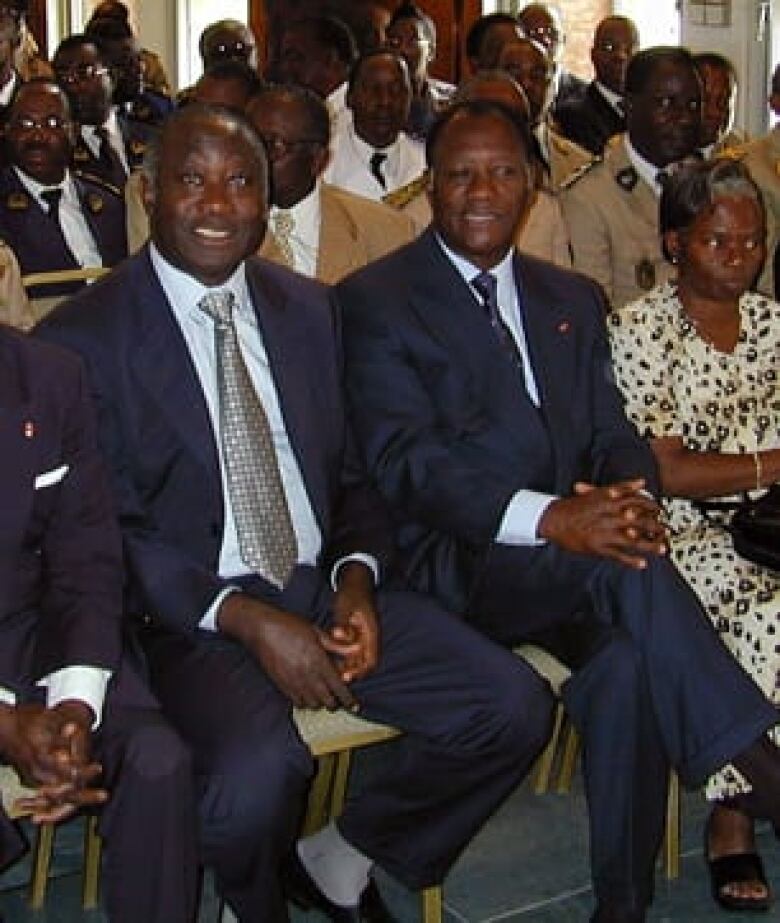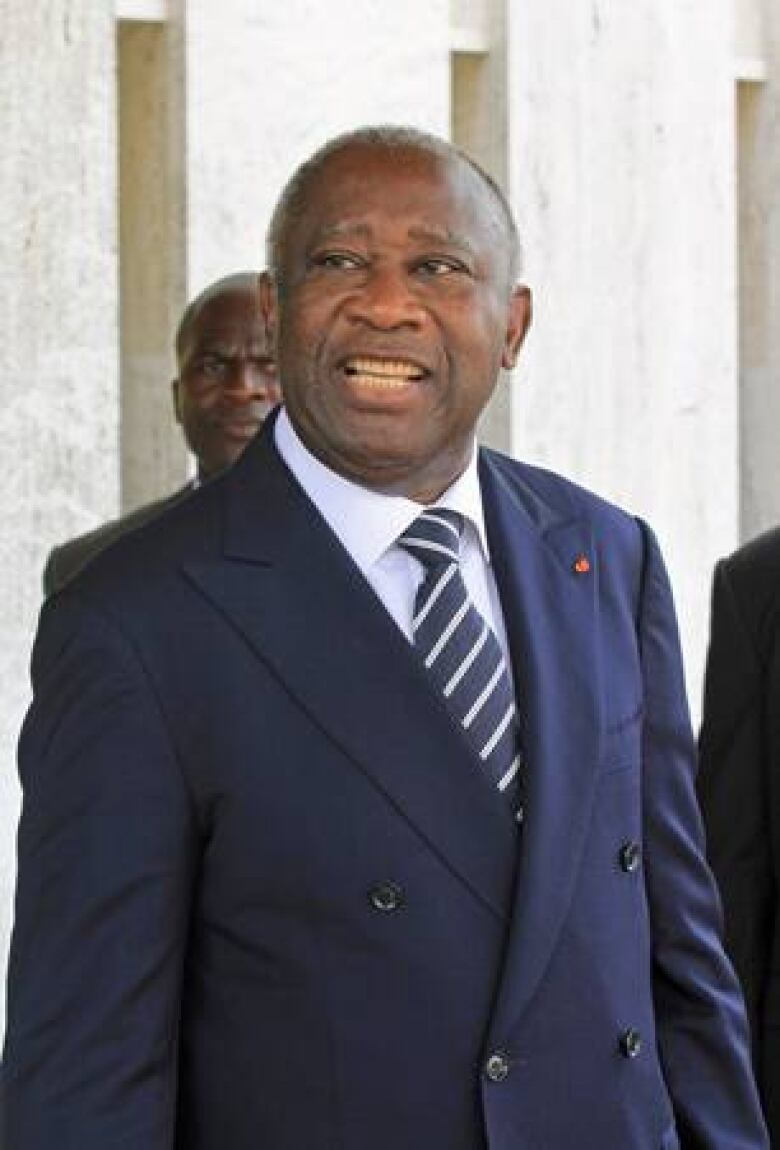A tale of 2 presidents
The story behind the political drama in Ivory Coast

In Ivory Coast, two men with intertwined stories claim to be president in a political drama worthy of Shakespeare.Laurent Gbagbo governs from the presidential palace and Alassane Ouattarafrom the five-star Golf Hotel, alsoin Abidjan.
The backdrop to their story is a country that not long ago was one of the wealthiest in Africa.
After a brief civil war in 2002, Ivory Coast is a country divided: north and south, Muslim and Christian,Ivorian and non-Ivorian ancestry.Meanwhile, the economy is dominated by multinational, especially French, corporations.
Well-educatedrivals
Alassane Ouattara and Laurent Gbagbo were born three years apart in 1942 and 1945 in Ivory Coast (also known asRpublique Cte d'Ivoire), then a colony of France.
Both men are highly educated, with degrees from abroad.Ouattara earned three degrees in the United States, including a PhD in economics from the University of Pennsylvania in 1972.
Gbagbo's degrees include a PhD in history from the L'universit Paris Diderot in 1979.Hisstudies were delayed because he was a political prisoner from 1971 to 1973.

While studying for his doctorate, Ouattaraworked as an economist for the International Monetary Fund in Washington.In 1973 he moved to Paris to work for the Central Bank of West African States. In the 1980s and 1990s, he held senior positions at both the bank and the IMF.
Ivory Coast president for life
Both men were teenagers when Ivory Coast gained independence from France in 1960. The country's first president, Flix Houphout-Boigny, would rule for 33 years.
He had been a cabinet minister in France's government.Before that, Houphout-Boignytrained to be a doctor but left medicine to work on his prominent family's cocoa farm.
In her 2006 book, Bitter Chocolate,As It Happens hostCarol Off writes that, "Ivory Coast would be run more or less as a dictatorship under Houphout-Boigny, with no free press, no opposition parties and no democracy."Off immediately adds: "What the people got in exchange was the strongest economy in sub-Saharan Africa."
That economy was built on one product: cocoa.Under Houphout-Boigny, Ivory Coast became the world's largest cocoa producer.But by the end of hisrule, and his death from prostate cancer in 1993, what had been called the African miracle was becoming a mirage.

Gbagbo leadsopposition
During the 1980s, Laurent Gbagbo was emerging as the opposition leader to Houphout-Boigny.In 1980 he began teaching at the University of Abidjan and quickly became an activist in his union and also formed an opposition group, later named the Ivorian Popular Front (FPI).
In 1982 he went into exile in France for six years.French journalist Pierre Haski remembers Gbagbo from this time as "the brightest and one of the more enlightened of the large population of African exiles and would-be presidents in Paris."
Two months after returning to Ivory Coast, he was elected leader of the FPI.
In 1990, Houphout-Boigny permitted multi-party elections.The only candidate to run against him wasGbagbo, who received 18 per cent of the vote.In the parliamentary elections that followed, Gbagbo won a seat in the national assembly.
Ouattara becomes prime minister

Meanwhile, Houphout-Boigny had persuaded Ouattara to return to Ivory Coast and deal with the country's economic crisis.After the election, Houphout-Boigny made him his prime minister.
Ouattara brought in unpopular austerity measures to address the financial problems, which led to protests andGbagbo being jailed in 1992 for his political activity.He was sentenced to two years but released later that year under a general amnesty.
Ouattara was prime minister until Houphout-Boigny's death in 1993.Although viewed as a technocrat, he wanted to take over as president but lost a brief power struggle with Henri Konan Bdi,president of the national assembly.
Ouattara returned to Washington and the IMF, awaiting his turn.
Doctrine divides Ivory Coast
As president, Bdi introduced a vague doctrine called "ivoirit," which eventually came to mean that only people with pure Ivorian ancestry should have full civil rights.
Houphout-Boigny had encouraged foreigners to move to Ivory Coast to work on the cocoa farms and they came in droves, accounting for about a third of the population, including their descendents.
The primetarget of the doctrine was Ouattara.Although he was born in Ivory Coast, his father was from what is now Burkina Faso.
To make doubly sure that Ouattara could not run in the 1995 elections, the laws were changed to require a presidential candidate to have Ivorian parents and to have lived in the country for the previous five years.
Both Ouattara's and Gbagbo's parties boycotted the election, allowing Bdi an easy victory.
The unpopular Bdi was overthrown in a military coup in 1999.Elections followed the next year with two main candidates: the head of the junta, Gen. Robert Gu, and Laurent Gbagbo.(The Supreme Court had ruled that Bdi and Ouattara were both ineligible.)
Gbagbo wins 2000 election
What followed was a prequel to the election in 2010.
Preliminary results had Gbagbo ahead.Gu had the electoral commission dissolved and the results readjusted because of alleged electoral fraud sohe could be declared the winner.
Protests followed, the army eventually sided with Gbagbo and the presidency was soon his.
During the campaign, Gbagbo expressed support for the ivoirit doctrine, in terms similar to Bdi's. After the dust settled, and amid increasingly frequent racially motivated violence between migrants and Ivorians, politicians made attempts at reconciliation.In 2002, there was even a meeting involvingGbagbo, Bdi, Gu and Ouattara.
Civil war in 2002 splits country
However, things unravelled later that year. Military mutiny escalated into civil war, in which the rebels seized control of the predominantly Muslim north half of Ivory Coast.
France intervened and soon there was a ceasefire, with the country split between the rebel north and Christian south.Ouattara, a Muslim, was born in the north.
In 2005 the Gbagbo government, the rebels called the Forces Nouvelles (New Forces) and other factions reached a disarmament agreement.
A month later,old political enemies Ouattara and Bdi formed a new coalition.
The parties in this "Rally of Houphoutistes" would compete in the first round of the elections scheduled for that October, but if only one of their candidates made it through to the second round the other parties would back him.In other words, their goal was to defeat Gbagbo.
And that is pretty much what happened, but not before a five-year election campaign during which the vote was postponed six times.The tally from the first round of voting for president on Oct. 31, 2010, was:
- Laurent Gbagbo, FPI, 38 per cent
- Alassane Ouattara, RDR, 32 per cent
- Henri Konan Bdi, PDCI, 25 per cent
The results were mostly along ethnic lines. Gbagbo did well in the west and south. Ouattara's support was in the north and Bdi's in central east Ivory Coast, home to his Baoule ethnic group.
Ouattara vs. Gbagbo in 2nd round
As agreed, Bdi threw his support behind Ouattara for the second round on Nov. 28, 2010,and his voters apparently followed.
After the votes were counted Ouattara 54 per cent, Gbagbo 46 per cent events unfolded as they had in the previous election in 2000, but with Gbagbo in the other role. This time Ouattara played Gbagbo's old role as victorious challenger and Gbagbo now played the defeated incumbent trying to stay in power nevertheless.
'The two kings, equal in lustre, were now best, now worst, as presence did present them.' William Shakespeare, Henry VIII
Now both men are playing the same role: president.Gbagbo clings to power with the support of the army and control of the state media.Ouattara has the support of the international community and the rebels, who are still armed.
In this drama, the next act also could be a repeat: civil war.












_(720p).jpg)


 OFFICIAL HD MUSIC VIDEO.jpg)
.jpg)



























































































